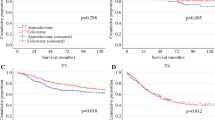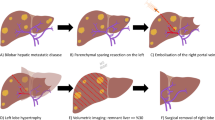Abstract
Background and aims
In locally advanced primary transverse colon cancer, a tumor may cause perforation or invade adjacent organs. Extensive resection is the best choice of treatment, but such procedures must be weighed against the potential survival benefits. This study was performed to identify the clinicopathological features and treatment outcomes of such tumors.
Materials and methods
We retrospectively reviewed the database of the Colorectal Cancer Registry of Chang Gung Memorial Hospital between February 1995 and December 2005. Patients with colon cancer sited between the hepatic and splenic flexure that involved an adjacent organ without distant metastasis were defined as having locally advanced transverse colon cancer.
Results
A total of 827 patients who underwent surgery for transverse primary colon cancer were enrolled in the study. Stage II and stage III colon cancer were diagnosed in 548 patients. Thirty-two (5.8%) patients were diagnosed with locally advanced tumors. Multivariate analysis revealed that stage III, preoperative carcinoembryonic antigen ≥5 ng/mL, a tumor with perforation or obstruction, and the presence of a locally advanced tumor were significant prognostic factors for both overall and cancer-specific survival. Postoperative morbidity rates differed significantly between the locally advanced and non-locally advanced tumor groups (22.7% vs. 12.3%, P < 0.01). No significant overall survival difference was observed among the stage II transverse colon tumors (P = 0.21).
Conclusion
Surgical resection of locally advanced transverse colon tumors resulted in a higher morbidity and mortality than that of non-locally advanced tumors, but the benefit of extensive surgery in the case of locally advanced tumors cannot be underestimated. Furthermore, this benefit is more pronounced in the case of stage II tumors.

Similar content being viewed by others
References
Gebhart C, Mayer W, Rukriegel S et al (1999) Multivisceral resection of advanced colorectal carcinoma. Langenbecks Arch Surg 384(2):194–199
Lehnert T, Methner M, Pollok A et al (2002) Multivisceral resection for locally advanced primary colon and rectal cancer: an analysis of prognostic factors in 201 patients. Ann Surg 235(2):217–225
Alberts SR (2006) Evolving role of chemotherapy in resected liver metastases. J Clin Oncol 24:4952–4953
Benoist S, Brouquet A, Penna C et al (2006) Complete response of colorectal liver metastases after chemotherapy: does it mean cure? J Clin Oncol 24:3939–3945
Mendenhall WM, Amos EH, Rout WR et al (2004) Adjuvant postoperative radiotherapy for colon carcinoma. Cancer 101(6):1338–1344
Orkin BA, Doxois RR, Beart RW (1989) Extended resection for locally advanced primary adenocarcinoma of the rectum. Dis Colon Rectum 32:286–292
Mc Glone TP, Bernia WA, Elliotz DW (1982) Survival following extended operations for extracolonic invasion by colon cancer. Arch Surg 177:595–599
Hunter JA, Ryan JA, Schultz P (1987) En bloc resection of colon cancer adherent to other organs. Am J Surg 117:595–599
Thomas L, Mascha M, Andreas P (2002) Multivisceral resection for locally advanced primary colon and rectal cancer. Ann Surg 235:217–225
Tang R, Chen HH, Wang YL et al (2001) Risk factors for surgical site infection after elective resection of the colon and rectum: a single-center prospective study of 2,809 consecutive patients. Ann Surg 234:181–189
World Health Organization (2000) International Classification of Diseases for Oncology. 3rd edition
Printz C (2010) New AJCC cancer staging manual reflects changes in cancer knowledge. Cancer 116:2–3
Hslow SF, Frost DB (1988) Extended resection for primary colorectal carcinoma involving adjacent organ or structures. Cancer 62:1637–1640
Eisenberg SB, Kraybill WG, Lopez MJ (1990) Long-term results of surgical resection of locally advanced colorectal carcinoma. Surgery 108:779–786
Rowe VL, Frost DB, Huang S (1977) Extended resection for locally advanced colorectal carcinoma. Ann Surg Oncol 4:131–136
Gall EP, Tonak J, Altendorf (1987) A multivisceral resection in colorectal cancer. Dis Colon Rectum 30:337–342
Kelly WE, Brown PW, Lawrence W et al (1981) Penetrating obstructing, and perforating carcinomas of the colon and rectum. Arch Surg 116:381–384
Marshall SF, Knud HJ (1957) Gastrojejunocolic and gastrocolic fistula. Ann Surg 145:770–782
Amlicke JA, Ponka JL (1964) Gastrocolic and gastrojejunocolic fistulas. A report of sixteen cases. Am J Surg 107:744–750
Akwari OE, Edis AJ, Wollaeger EE (1976) Gastrocolic fistula complicating benign unoperated gastric ulcer. Report of four cases and review of the literature. Mayo Clin Proc 51:223–230
Karakousis CP, Greenberg PH (1979) Gastrocolic fistula as a complication of benign gastric ulcer. Arch Surg 114:1426–1428
Krivisky BA, Bier SJ, Ostrolenk DG (1986) Gastroenterocolic fistula complicating benign peptic ulcer. Mt Sinai J Med 53:229–300
Shigetoshi M, Toshifumi E, Osao O et al (1994) Gastrocolic fistula originating from transverse colon cancer: report of a case and review of the Japanese literature. Surg Today Jpn J Surg 24:1085–1089
Sauer R, Becker H, Hohenberger W et al (2004) Preoperative versus postoperative chemoradiotherapy for rectal cancer. N Engl J Med 351:1731–1740
Rodel C, Martus P, Papadoupolos T et al (2005) Prognostic significance of tumor regression after preoperative chemoradiotherapy for rectal cancer. J Clin Oncol 23:8688–8696
Schuhmacher CP, Fink U, Becker K et al (2001) Neoadjuvant therapy for patients with locally advanced gastric carcinoma with etoposide, doxirubicin, and cisplatinum: Closing results after 5 years of follow-up. Cancer 91:918–927
Cunningham D, Allum WH, Stenning SP et al (2006) Perioperative chemotherapy versus surgery alone for resectable gastroesophageal cancer. N Engl J Med 355:11–20
Fisher ER, Wang J, Bryant J et al (2002) Pathobiology of preoperative chemotherapy: findings from the National Surgical Adjuvant Breast and Bowel Project B-18. Cancer 95:681–695
Gray RG, Morton D, Brown G et al (2010) Randomized phase II study of neoadjuvant chemotherapy with or without an anti-EGFR monoclonal antibody for locally advanced, operable colon cancer. J Clin Oncol 28:15s, TPS192
Author information
Authors and Affiliations
Corresponding author
Rights and permissions
About this article
Cite this article
Hung, HY., Yeh, CY., Changchien, CR. et al. Surgical resection of locally advanced primary transverse colon cancer—not a worse outcome in stage II tumor. Int J Colorectal Dis 26, 859–865 (2011). https://doi.org/10.1007/s00384-011-1146-3
Accepted:
Published:
Issue Date:
DOI: https://doi.org/10.1007/s00384-011-1146-3




